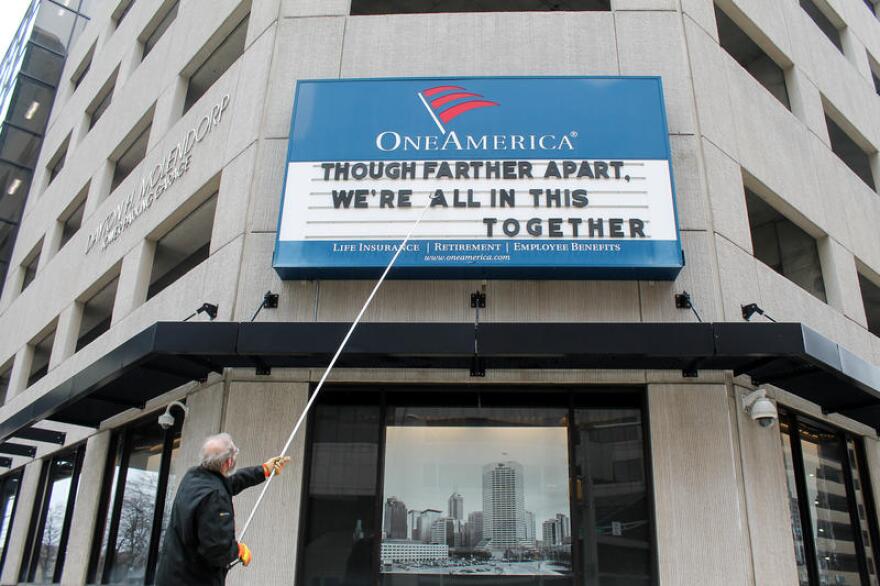A number of Midwest states and cities have issued “stay-at-home” orders, in an attempt to curb the new coronavirus, which continues to rapidly spread. The orders create restrictions on working, recreation and travel. Still, there are many things you can continue to do, and not all businesses have to close.
Why are we under a Stay-At-Home order?
Illinois, Indiana, and Ohio are among states that have issued these orders. Some metro areas, including St. Louis and Kansas City, issued similar orders in the absence of statewide action. The orders aim to help stop the spread of COVID-19.
We won’t know how effective it is for one to three weeks, because of the cycle of the novel coronavirus. So, the confirmed cases and deaths will continue to climb in that time period, health experts say.
But what does the Stay-At-Home order mean?
It means that the governor has mandated you stay indoors unless it’s essential that you leave – with a number of exemptions. Non-essential government and business operations will shut down. (Check the requirements of your own state for details.)
What are those exemptions?
Generally, things that are essential to the health and safety of you or members of your family or household. Some examples:
- Getting medical supplies or medication
- Visiting a health care professional
- Going to the grocery store
- Delivering food, groceries or cleaning products to members of your family
- Geting takeout food
- Caring for a family member or pet in another household.
LEE MAS: ¿Qué Necesita Saber Acerca Del Coronavirus? Tenemos Respuestas.
READ MORE: What Do You Need To Know About Coronavirus? We’ve Got Answers.
For businesses that are still open:
- Obtaining supplies to work from home
- Working at essential businesses, government facilities and nonprofit organizations
Outdoor exercise:
- Running, biking or taking a walk is acceptable. While exercising outside, you still should practice social distancing by staying at least six feet away from other people.
- Dog-walking is also totally fine.
- However, gyms, fitness centers and similar facilities will be closed to reduce the spread of the coronavirus.
Additional exemptions are outlined in state orders, such as this one from the governor'of Indiana.
What businesses are staying open?
Essential businesses and services generally include but are not limited to grocery stores, pharmacies, gas stations, police stations, fire stations, hospitals, doctor’s offices, health care facilities, garbage pickup and public transit.
Laundromats, dry cleaners and laundry service providers are considered essential businesses. Construction, hardware stories, auto repair, and hotels also fall under this category.
What businesses are shutting down?
State orders have generally affected businesses that attract large groups of people, such as theaters, restaurants and bars -- though takeout service is still allowed. Hair salons, spas, nail salons, tattoo parlor sand barber shops also are targeted.
Are roads and public transportation getting closed?
No. The roads will remain open – though you should only travel if it is for your health or essential work.
Public transportation, ride-sharing and taxis should only be used for essential travel.
How can I receive medical care?
Officials generally recommend that if you develop symptoms such as fever, cough and/or difficulty breathing, and have been in close contact with a person known to have COVID-19 or have recently traveled from an area with ongoing spread of COVID-19, stay home and call your health care provider.
Call in advance so your provider can take proper precautions to limit further transmission. Older patients and individuals who have severe underlying medical conditions or are immunocompromised should contact their health care provider early, even if their illness is mild.
If you have severe symptoms, such as persistent pain or pressure in the chest, new confusion or extreme fatigue, or bluish lips or face, contact your healthcare provider or emergency room and seek care immediately, but call in advance if possible.
Your doctor will determine if you have signs and symptoms of COVID-19 and whether you should be tested.
What about non-emergency medical care like eye exams or dental appointments?
Non-essential medical care such as eye exams and teeth-cleaning should be postponed. When possible, health care visits should be done remotely. Contact your health care provider to see what telehealth services they provide.
Contact Lauren at lchapman@wfyi.org or follow her on Twitter at @laurenechapman_.
This is a rapidly evolving story, and we are working hard to bring you the most up-to-date information. However, we recommend checking the websites of the Centers for Disease Control and Prevention for the most recent numbers of COVID-19 cases.
Throughout the year, Side Effects will work closely with Indiana Public Broadcasting and WFYI to ask Americans about health issues, as part of the America Amplified: Election 2020 initiative. To join our texting group, text elections to 73224; we'll send questions each month and use your answers to inform our reporting. To contact us directly with a question, email health@wfyi.org
America Amplified: Election 2020 is a public media initiative funded by the Corporation for Public Broadcasting. America Amplified is using community engagement to inform and strengthen local, regional and national journalism. Follow the initiative on Twitter at @amplified2020.





